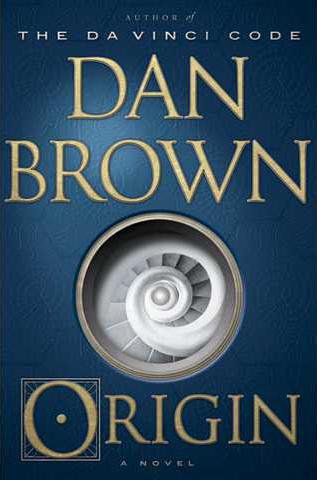"ORIGIN," by Dan Brown, Doubleday, 480 pages (f)
Where do we come from? Where are we going?
Those are the two essential questions that Dan Brown, author of The Da Vinci Code, asks in his latest book, Origin.
The fifth installment in Browns series follows Harvard professor Robert Langdon, who once again must solve a religious-based mystery by solving codes and puzzles.
This time, Langdon is invited to attend a presentation in Spain given by his former student Edmond Kirsch, which, Kirsch says, will change the way people view religion and God. Kirschs sudden, unexpected death during his presentation sends Langdon, as well as the soon-to-be queen of Spain Ambra Vidal, on a hunt to find out what his former student was going to announce specifically about the origin of life.
The novels short chapters make it an entertaining read. Each chapter flows into the next, keeping readers up with thoughts of "just one more chapter."
Brown masterfully guides readers from Langdons story to side plots related to the main storyline, providing better context for what happens to Langdon, deepening readers' understanding of the story.
Of course, those familiar with Browns previous books wont find anything new here. Langdon travels from city to city, solving riddle after riddle, until he discovers the mystery he hoped to solve, learning how the human race interacts with God.
New readers will undoubtedly enjoy the novel, and theres no need to have read Brown's previous books before hopping into this one. In fact, if this is a readers first foray into Langdons world, it will provide an entertaining beginning that will hook readers for any future installments.
However, old Brown fans looking for "Origins" to be new and revolutionary wont find novelty in its pages. Even the books hidden mystery isnt all that entertaining or surprising. Readers who have seen a psychological thriller movie, read a suspense book or investigated the potential dystopia created by tech can spot the final reveal a mile away.
But Browns been a successful author with his current style after all, theres a reason why millions of people have bought his books and that his movies have sold millions of tickets nationwide. Hes made the formula work, and it still inspires readers to read his books.
Brown set out to answer the questions where we've been and where we're going. Browns book comes from a familiar place, and thats also likely where its staying for the future.
Content advisory: "Origins" contains mild depictions of violence, some mild swearing and no sexual content.
Where do we come from? Where are we going?
Those are the two essential questions that Dan Brown, author of The Da Vinci Code, asks in his latest book, Origin.
The fifth installment in Browns series follows Harvard professor Robert Langdon, who once again must solve a religious-based mystery by solving codes and puzzles.
This time, Langdon is invited to attend a presentation in Spain given by his former student Edmond Kirsch, which, Kirsch says, will change the way people view religion and God. Kirschs sudden, unexpected death during his presentation sends Langdon, as well as the soon-to-be queen of Spain Ambra Vidal, on a hunt to find out what his former student was going to announce specifically about the origin of life.
The novels short chapters make it an entertaining read. Each chapter flows into the next, keeping readers up with thoughts of "just one more chapter."
Brown masterfully guides readers from Langdons story to side plots related to the main storyline, providing better context for what happens to Langdon, deepening readers' understanding of the story.
Of course, those familiar with Browns previous books wont find anything new here. Langdon travels from city to city, solving riddle after riddle, until he discovers the mystery he hoped to solve, learning how the human race interacts with God.
New readers will undoubtedly enjoy the novel, and theres no need to have read Brown's previous books before hopping into this one. In fact, if this is a readers first foray into Langdons world, it will provide an entertaining beginning that will hook readers for any future installments.
However, old Brown fans looking for "Origins" to be new and revolutionary wont find novelty in its pages. Even the books hidden mystery isnt all that entertaining or surprising. Readers who have seen a psychological thriller movie, read a suspense book or investigated the potential dystopia created by tech can spot the final reveal a mile away.
But Browns been a successful author with his current style after all, theres a reason why millions of people have bought his books and that his movies have sold millions of tickets nationwide. Hes made the formula work, and it still inspires readers to read his books.
Brown set out to answer the questions where we've been and where we're going. Browns book comes from a familiar place, and thats also likely where its staying for the future.
Content advisory: "Origins" contains mild depictions of violence, some mild swearing and no sexual content.

